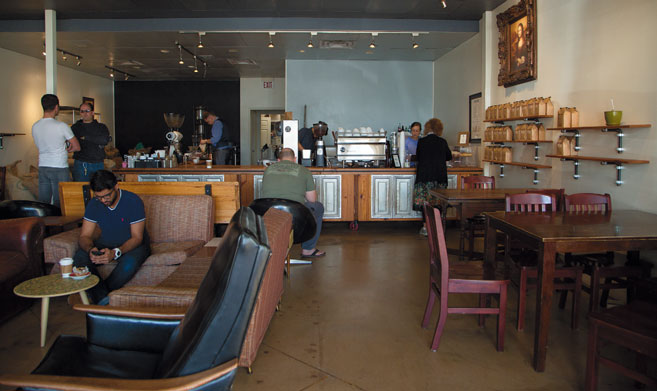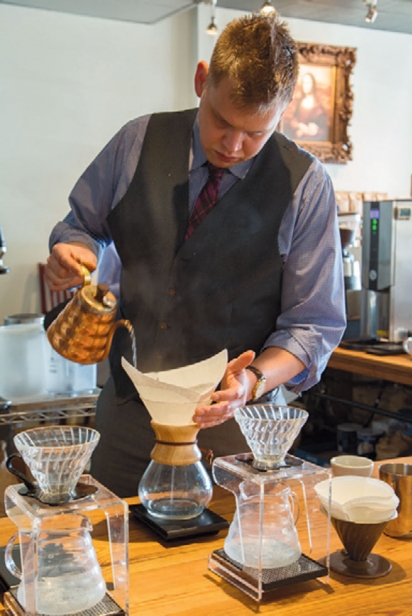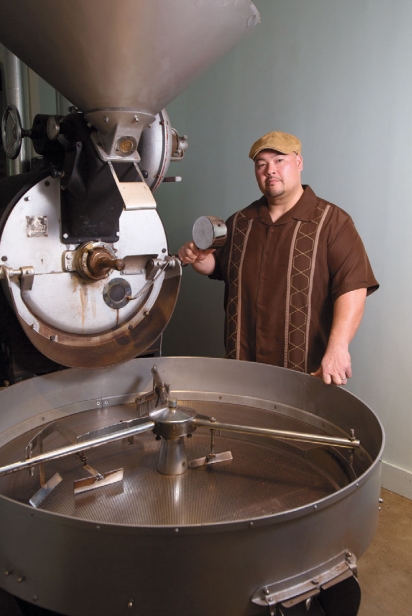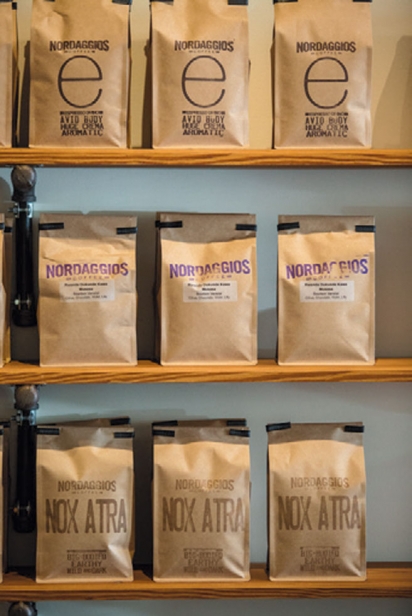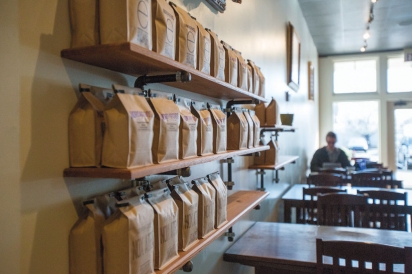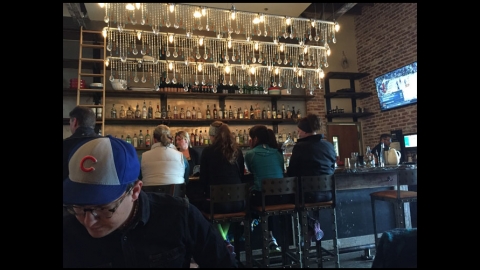Nordaggios Coffee
Fresh rain soaking hot pavement, chopped cilantro over a lime-juice-stained cutting board—only a handful of aromas are as pleasantly debilitating as a small coffee shop during roasting hours. There’s a reason I sometimes leave cups of spent espresso grinds in the back of my Volkswagen. The tranquilizing smell of burning beans captivated me long before I developed a palate for their bitter concentrate.
The nostalgia hits me yet again as I walk into South Tulsa’s Nordaggios on roast day, only this time, I’ve been invited to the ritual. Owner Tor Nordstrom and roaster Bobby Ellis are equally passionate and driven to deliver a cup of coffee that needs no particular décor to be enjoyed. They are generous with their accumulated coffee knowledge, and I am almost intimidated by their eagerness to dive into the rich history confined within the walls of this minimalist coffee shop.
Ellis is roasting a compelling Colombian coffee from the department of Tolima. The valleys and jungles of Tolima once grew high quality coca—the plant containing cocaine—for drug cartels. With the recent relationship established between the United States and Colombian president Andres Pastrana, American anti-narcotics agents have upped their presence in the Colombian drug war. They are seizing more plantations and waging more war than ever, freeing up hefty acreages of prospective farmland.
The potential prosperity of farmland does however, come with a price. In addition to the new climate of the drug war, drug traffickers, the Revolutionary Armed Forces of Colombia (FARC)—a guerrilla army waging a decades-long war against the Colombian government—and the general turbulence of the Colombian economy, a violent and risky environment for coffee producers is ensured.
However, Ellis is confident in organizations such as Inconexus—a sustainable trade organization offering improvement programs for small farmers and indigenous groups. These non-government organizations have been working with these farmers to revise infrastructure, create safer export environments and make the connections they need to get the money they deserve for their coffee. Now, small farmers are utilizing this well-tended soil to grow hardy coffee beans. “Tolima’s topography and tree shade produce beans now used by baristas in competition because of their rare versatility and intense flavor,” Ellis adds.
As conversation continues, Ellis pours the pre-weighed Tolima beans into a 1950s German Probat roaster. The rugged machine functions on an electronic belt drive that fuels a ceramic fire for roasting. It’s like a classic car—beautiful and functional, yet temperamental. A replacement for the last gasket that went out had to be handcrafted by a local leatherworker. To compensate for quirks in the temperature meter, Ellis uses auditory cues, listening for the first and second crack of the roasting beans. It’s an intimate process from start to finish.
As the roasting continues, the beans undress from their chaff , or skin, which is set aside for employee composting. After the first crack, we let a few partially roasted beans trickle into the collector and sample their ongoing transformation. Two and a half minutes later, the hot beans reach their second crack, subtle but satisfying as it vibrates against my eardrum. Having worked with many roasters, Ellis favors the Probat: “Its ability to produce particular sweetness to complement the natural acidity of the final bean is unmatched.”
As the roasting comes to an end, I begin anticipating the brewing method we’ll use to taste the final product. I feel like a total amateur when I’m reminded of the resting period a roast must undergo before tasting. After the Tolima ages for a few days, I return for a second visit. Ellis presents the coffee through the Chemex V60 pour over. He grinds 33 grams of coffee beans on the money, achieving the perfect texture for optimal filtration in 480 grams of water. I take my first taste after the steam subsides. Just above room temperature, the coffee shines. Ellis explains this approach to tasting: “Think of a chicken soup recipe passed down through generations. The prep work is long and grueling, adding all the perfect spices, vegetables and love. If that soup is tasted right after high heat, it will just taste like hot soup. However, if you let it cool down a bit, all of a sudden you can taste all of the soup’s particular highlights, and the hard work that went into it.” Obeying this technique, I finally pick up on the rich cocoa, dried cranberry and a funny hint of old Tootsie Rolls one might find ironically in the dentist’s waiting room.
The conversation shifts as we settle in around Nordaggios’ distinctive bar. Weighing more than a ton and estimated to be about 600 years old, the reclaimed Longleaf Yellow Pine comes from a 1900s cotton manufacturing plant in the Carolinas. The bar serves as yet another history lesson as we enjoy the last of our drinks.
The Tolima changes my perspective on Colombian coffees. Never again will I skip over a bean based solely on its place of origin. It’s just one example of the highly unique coffees—each with a story of its own—that Nordaggios imports regularly to the Tulsa market and parts of Arkansas and Texas. With increasing options in Tulsa’s ever-evolving coffee scene, it’s easy to get lost among bean varietals, origins, roasting techniques and brewing methods. Nordaggios offers complex and diverse coffees that stand on their own, with minimal trappings—just a handful of brewing methods and two syrups. Nordstrom and Ellis are eager to share their knowledge and excitement with patrons and they welcome questions about their products’ origins and defining characteristics. For curious coffee drinkers, an intellectual journey can accompany each cup.
For more information, visit Nordaggios.com or call 918.671.6673.
Monday 7:30am–11pm
Tuesday–Friday 7:30am–midnight
Saturday 8am–midnight
Sunday 9am–11pm


